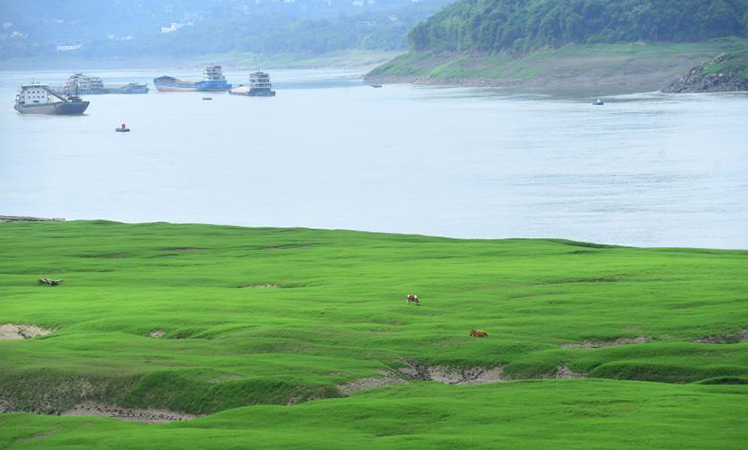Judicial innovations arouse public environmental awareness
GUIYANG, June 14 (Xinhua) -- The major players in China's carbon market are enterprises, but individuals who engage in malpractice on environmental protection are now required by judiciaries to purchase carbon sinks.
Carbon sinks, such as forests, grasslands and oceans, absorb and store carbon dioxide from the atmosphere. Revenues generated from forestry carbon sink trading are used to fund activities such as afforestation and paying forest rangers.
Although funds from individuals account for a small proportion of the transactions in carbon sinks, some local courts in China are using the practice to boost environmental awareness among the public.
INNOVATIVE ECOLOGICAL COMPENSATION
A man surnamed Luo in southwest China's Guizhou Province was ordered earlier this year to pay 20,668 yuan (about 3,062 U.S. dollars) for a carbon sink deal, together with a 4,000 yuan fine, to compensate for the loss he inflicted on local forests.
Luo felled 469 trees in his village in Jianhe County, Qiandongnan Miao and Dong Autonomous Prefecture, in May 2021. He was charged for illegal logging, as his felling license, which strictly limits the stock volume, species and regeneration measures, had expired.
Committing such a crime could lead to three to seven years imprisonment with fines. However, considering the fact that rural residents need to fell trees for house-building, a more lenient punishment without factual imprisonment can better achieve the legal and social effects, according to Wu Zhangyi, vice president of the Leishan County People's Court, which has jurisdiction over environmental cases in Qiandongnan.
The previously employed remedy of replanting is no longer practical, according to Wu. The forest coverage rate of Leishan has already reached 72 percent, and there is not enough barren land for wood regeneration.
Luo's case has opened up a new route for ecological compensation for regions with ample forest resources, Wu added. The carbon sink in the case is estimated to offset around 344 tonnes of carbon dioxide, according to forestry authorities.
PUBLIC ENVIRONMENTAL AWARENESS
After Luo's settlement, verdicts in similar cases, requiring the purchase of forestry carbon sinks, were reported in the provinces of Shaanxi, Sichuan and Zhejiang.
China vows to tackle climate change and unswervingly follow the path of green and low-carbon development. It has pledged to peak carbon dioxide emissions before 2030 and achieve carbon neutrality before 2060.
The country's first environmental protection tribunal was founded in 2007 in Guizhou, and a total of 34 such tribunals have since been set up in the province.
The tribunals have established jurisdictions over environmental issues related to forests, water, mountains, wetlands, ancient villages and natural parks, and sectors including tea, liquor and mining, according to Li Li, the presiding judge of the environmental tribunal of Guizhou Provincial Higher People's Court.
"Better protection makes the ancient villages more attractive and brings more wealth to the locals," said Yang Zaimin, who manages nine cabins that accommodate 1,000 guests annually in Zaima Township in Qiandongnan.
His township's government once faced a public interest litigation case for lack of supervision of the protection of ancient houses that dated back over 200 years.
Since then, villagers have had more awareness of preservation, according to Yang. Now, there are no more cement buildings surrounding ancient architecture and no illegal construction on rivers, with the original ancient style of the village maintained.
In Jiangkou County of Guizhou, four fishers convicted of illegal fishing in 2020 were ordered to release more than 70,000 fish fry and take part in river patrols for six months.
The lawsuit on ecological restoration has an educative effect on the public, said Jin Fei, the presiding judge with the environmental tribunal of Jiangkou County People's Court.
Qin Huiwu, a villager who witnessed the fish fry release activity, said efforts to improve environmental awareness have borne fruit for the locals.
"We replant trees in the forest and release wildlife back into nature, and the beautiful scenery in return helps us earn many times as much money from eco-tourism," said Qin.
Photos
Related Stories
Copyright © 2022 People's Daily Online. All Rights Reserved.









